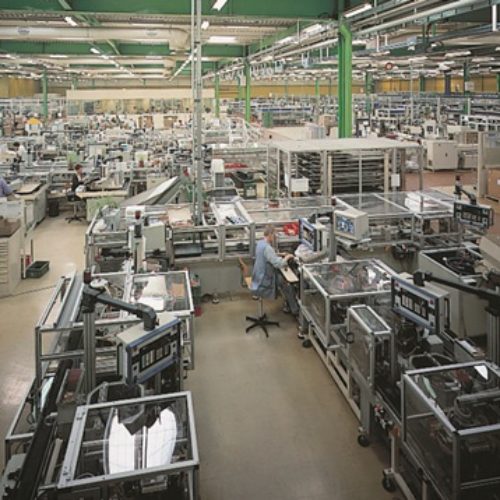In December 1999 the concern signed an implementation contract with BCC (now All for One Poland). The main factor to influence the choice of BCC as an implementation partner was BCC expertise in such projects.
Implementation course
Implementation works started in January 2000. the project covered the headquarters seated in Warsaw, trade agencies and a subsidiary – Schneider Electric Bukowno, situated near Olkusz.
The first phase of the project was an analysis and documenting best practices used and tested in the units of Schneider Electric in other countries. The analysis showed the best solution to directly transfer to the Polish unit and the solutions that needed adjusting. It also identified the processes that had to be designed from the scratch as there were no models for them.
During the analysis the concern documentation and business processes realized in Schneider Electric Hungary were used. On the basis of analyzing those solutions BCC consultants supported the employees of Schneider Electric in creating a general concept of SAP solutions for the Polish unit of the concern.
In May 2000 the real implementation started. It was executed according to BCC methodology. In December 2000 the system was ready to work.
In January 2001 Schneider Electric Polska started using SAP solutions in the following areas: finance accounting, controlling, project system, materials management, warehouse management, production planning and sales and distribution.
Advantages of SAP
Production planning
The implementation of SAP functionality in production planning covered discrete production of electrotechnical devices in Bukowno and order-based production performed in Warsaw. It serves both the production of repetitive articles, with permanent material specification, and the devices tailored to customer’s order. Some specifications are taken over to SAP applications from external software.
SAP solutions support making coarse plans of sales and production, current planning material needs, production order service and executing discrete production. Besides typical production processes Schneider Electric uses also: production for project needs, subcontracting, device dismantling.
Project system
Schneider Electric uses SAP solutions for complete running of design processes, acquirement (by purchase or own production) and installation of electrotechnical devices of high, medium and low voltage and preparing the applications of industrial automatics. The functionality of project system in SAP allows to model the project structure, run the logistic processes and accounting. In logistics SAP helps in running the attribution of products, materials, services to projects in order to buy them or start their production.
SAP also registers confirmations of services supplied for projects and runs the shipment of devices to their planned installation locations. Project accountancy consists in entering the planned income (automatically from the incoming customer orders) and project costs, current registration of actual costs and income and periodical operations: charging projects with indirect costs, setting the project result based on the stage of progress and project settlement.
Apart from external costs, in Schneider projects also employees’ costs are settled with the use of inter-application spreadsheet of work time (CATS). Implementing SAP solutions gave a tool to facilitate project management they are running, e.g. in answering the question if the devices needed for the project have already been ordered and when theycan be delivered.
The controllers gained a tool to systematize and facilitate the project financial evaluation, periodical settling their result and early spotting disadvantageous deviations.
Materials management
To give some idea of the materials management scale or, in wider sense, logistics in Schneider Electric, it is advisable to point out a few-dozen-thousand-index list (references) of materials or hundreds of items in delivery documents, that are not a rare event.
The implemented SAP solutions in a complete way support the purchase made by Schneider Electric Polska, from trade goods purchase (mainly import), to raw materials and components for production, project devices, services, fixed assets to office supplies.
Demands that arise in various departments of the company (sales, production, project center, management and administration) are processes by logistics of Schneider Electric, that creates and monitors orders to suppliers.
Thank to the use of EDI solutions (electronic data interchange), communication with vital suppliers is done without paperwork. Schneider Electric sends its orders electronically, and the suppliers the same manner confirm them or change and notify of deliveries. Also invoices for deliveries are sent electronically and next are read and automatically posted in SAP.
Warehouse management
Warehouse management besides the ‘stock management’ used by many Polish companies (managing the quantity and value warehouse records and materials movements) is supported by an advanced function of warehouse management. SAP warehouse management allows to run a high-rise warehouse, warehouse management down to the level of storage locations (e.g. single racks), servicing of materials placement in a warehouse, their deliveries to production, shipment to customers (goods) or for projects.
Sales and distribution
SAP implementation in sales and distribution covered the whole area of sales in Schneider Electric, i.e. sale of goods (including indirect sale, in which the goods are delivered straight to the end customers without sending then to Schneider warehouses), sale of products, projects, services, fixed assets and reinvoicing costs.
Thanks to SAP installation in commercial outlets it is now possible to spread customer order registration while at the same time centralize supply, goods storage, shipping and invoicing.
Using the access control allows to confirm to customers the delivery terms on the basis of current stock levels and the terms of stock replenishment. Customer credit control safeguards against the transactions whose payment may be difficult to collect. The information registered during entering customers’ orders, dispatch and invoicing constitutes the basis for analyses of a multi-dimension information system of sale and report created especially for Schneider Electric.
Finance and controlling
Implementing SAP financial functions allows to use the system for creating reports required both by Polish law and for internal concern needs. This is possible thanks to the chart of accounts that is appropriately designed and controlling objects that make an analytical set.
Due to a wide range of the implementation of logistic functionalities, most data in finance is registered automatically (e.g. materials movements result in posting the values on accounts, issuing an invoice results in posting a liability, income and due tax).
SAP solutions in Schneider Electric run the following controlling areas: sales controlling, product cost calculation, indirect cost calculation.
In sales controlling with an analysis of contribution margin, not only invoiced sale data are registered and reported but also the values of incoming customer orders. Sales controlling is run in detail of a market segment, thus providing information on profitability of particular products, product groups in hierarchical structure, customers, customer groups, commercial agencies and any combination of all those factors. Besides registering actual data, taken from sale documents and invoices and cost settlements, sales controlling is used to make yearly and margin progress plans.
In planning a function of product cost calculation is used in Schneider Electric to calculate costs of goods, production orders and customer orders.
Thanks to the implementation of production planning it is possible to use quantity goods structures in cost calculation.
In actual product cost calculation (so-called cost drivers calculation) SAP system supports order-based production in Schneider Electric plant in Warsaw and discrete production in the plant in Bukowno. It supports current registration of production costs, settlement of indirect costs, automatic setting and posting production in progress and production deviations .
Cost centers are used as basic tools of an analysis of indirect production costs, general management cost and sales cost. If there is need for more detailed data, internal orders are used.
In indirect cost calculation the cost budget of organization units of are entered and then their realization is monitored. Besides standard settlement methods, also detailed data on costs of company cars taken from an external system are included into the indirect cost calculation.
Schneider Electricis world-known international concern that implementing modern solutions in industrial steering systems and automation and electrical power distribution. It is a world leader in production of low-voltage devices and machinery, elements of industrial steering, programmable logic controllers and devices to distribute medium-voltage electric power. Part of their products are manufactured in Poland: in a plant in Targówek, Warsaw, and in Bukowno near Olkusz.


